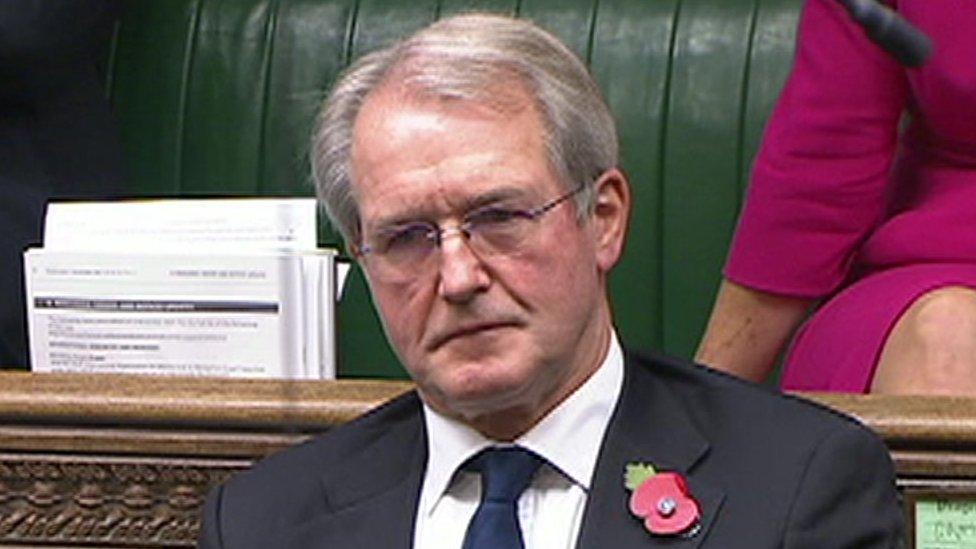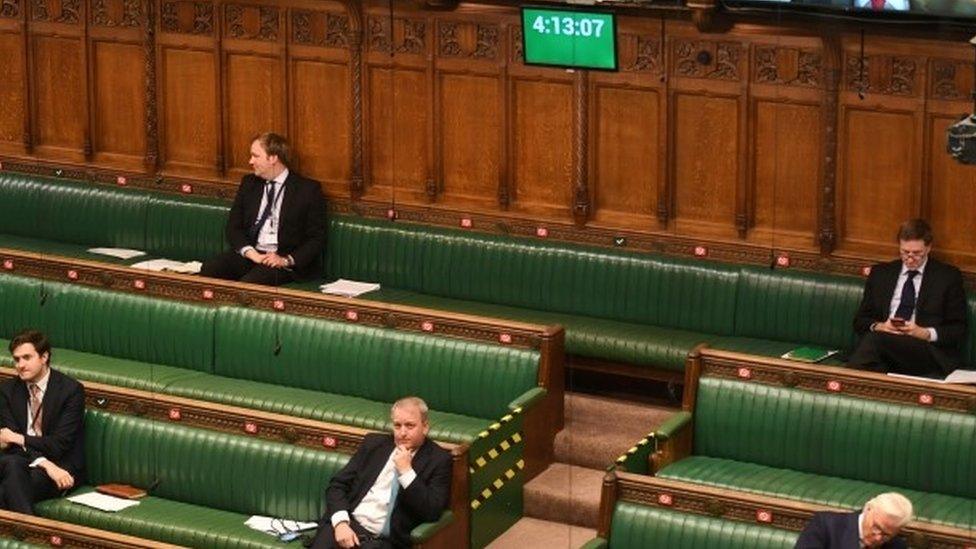Owen Paterson: Boris Johnson backs shake-up of MP standards rules
- Published
Angela Rayner accuses Boris Johnson of "scrapping the independent process"
Boris Johnson has backed a shake-up of the rules on MPs' behaviour, amid moves to prevent a senior Conservative being suspended from the Commons.
Owen Paterson was found to have misused his position to benefit two companies he worked for.
But he says he got unfair treatment and his allies will seek to change the rules and scrap his punishment in Commons votes later on Wednesday.
The government has ordered all Tory MPs to back the suggested reforms.
During Prime Minister's Questions, Mr Johnson also argued that a right of appeal must be introduced for cases such as Mr Paterson's to ensure "natural justice".
But Labour deputy leader Angela Rayner said the Conservatives were "wallowing in sleaze" and accused them of changing the rules to suit their own ends.
MPs are due to vote later on whether to endorse a recommendation from the Commons Standards Committee that Mr Paterson be suspended for 30 days - which could potentially trigger a by-election in his North Shropshire constituency.
Mr Paterson's supporters are trying to overturn the recommendation.
They are also calling for a new committee to be set up to consider changes to the process for investigating MPs.
If the Commons backs this - which is likely to happen, given the government's large majority - Mr Paterson's proposed suspension would be put on hold.
As the debate opened, Commons Leader Jacob Rees-Mogg said the issue was not, and should not become, "partisan".

Since the 2009 expenses saga, or maybe even the scandals that plagued John Major's government in the '90s, the issue of policing politicians has tested every generation of MPs, who were plagued by the accusation that they were all too willing to let each other off the hook, for offences that would have much more serious consequences for ordinary folk.
A decade ago Parliamentary careers were floundering over expenses claims which varied from the wildly self-indulgent to the outright fraudulent.
But maybe memories have dimmed - the influx of new MPs and the passage of time have softened memories of what was, at the time, a colossal institutional trauma.
At the moment, the system for examining breaches of the rules for MPs is a complicated one, with careers dependent on its verdicts.
So it's no surprise parliamentarians are deeply concerned about its workings.
But today's vote entangles an individual case with concerns about the working of the system - and entanglement may spell real trouble for Parliament.

Earlier, Mr Johnson said he supported the proposed reforms and that MPs found to have broken the rules should get a right of appeal, as would happen with doctors and teachers found guilty of misconduct.
Politicians must "consider the procedures of this House in a spirit of fairness", he added.
But Ms Rayner said: "It's one rule for everybody else and one rule for the Conservatives. When they break the rules, they just remake the rules."
"In no other profession in our country could someone be found guilty by an independent process and just have their mates vote them back into the job," she added.

Former Northern Ireland Secretary Owen Paterson watches MPs debate his future
The prime minister's spokesperson said the changes would not amount to MPs "marking their own homework".
But Liberal Democrat chief whip Wendy Chamberlain called the government's "support" of Mr Paterson "shameful", adding that it would "inevitably damage" trust in the system.
The committee's recommendation on Mr Paterson followed an investigation by Parliament's standards commissioner, Kathryn Stone.
Its report, external said the former cabinet minister had breached Commons lobbying rules in making approaches to the Food Standards Agency and Department for International Development ministers about Randox and Lynn's Country Foods, which employed him as a paid consultant.
The committee found that Mr Paterson had used his parliamentary office on 16 occasions for meetings relating to his outside business interests between October 2016 and February 2020 and sent two letters relating to business interests on House of Commons headed notepaper.
It described the MP's actions as "an egregious case of paid advocacy" adding that "no previous case of paid advocacy has seen so many breaches or such a clear pattern of behaviour in failing to separate private and public interest."
Mr Paterson, a former cabinet minister, has denied any wrongdoing, and argued his approaches were within the rules because he was seeking to alert ministers to defects in safety regulations.
He has also said the process was "a major contributory factor" in the death of his wife, Rose, who took her own life last year.
Mr Johnson told the Commons: "The issue in this case, which involved a serious family tragedy, is whether a member of this House had a fair opportunity to make representations in this case and whether, as a matter of a natural justice, our procedures in this House allow for proper appeal."
In its 175-page report, the cross-party committee considered Mr Paterson's criticisms of the investigation and rejected them.
It also said it had taken the circumstances of his wife's death into account when considering the MP's conduct.
Related topics
- Published21 July 2020
